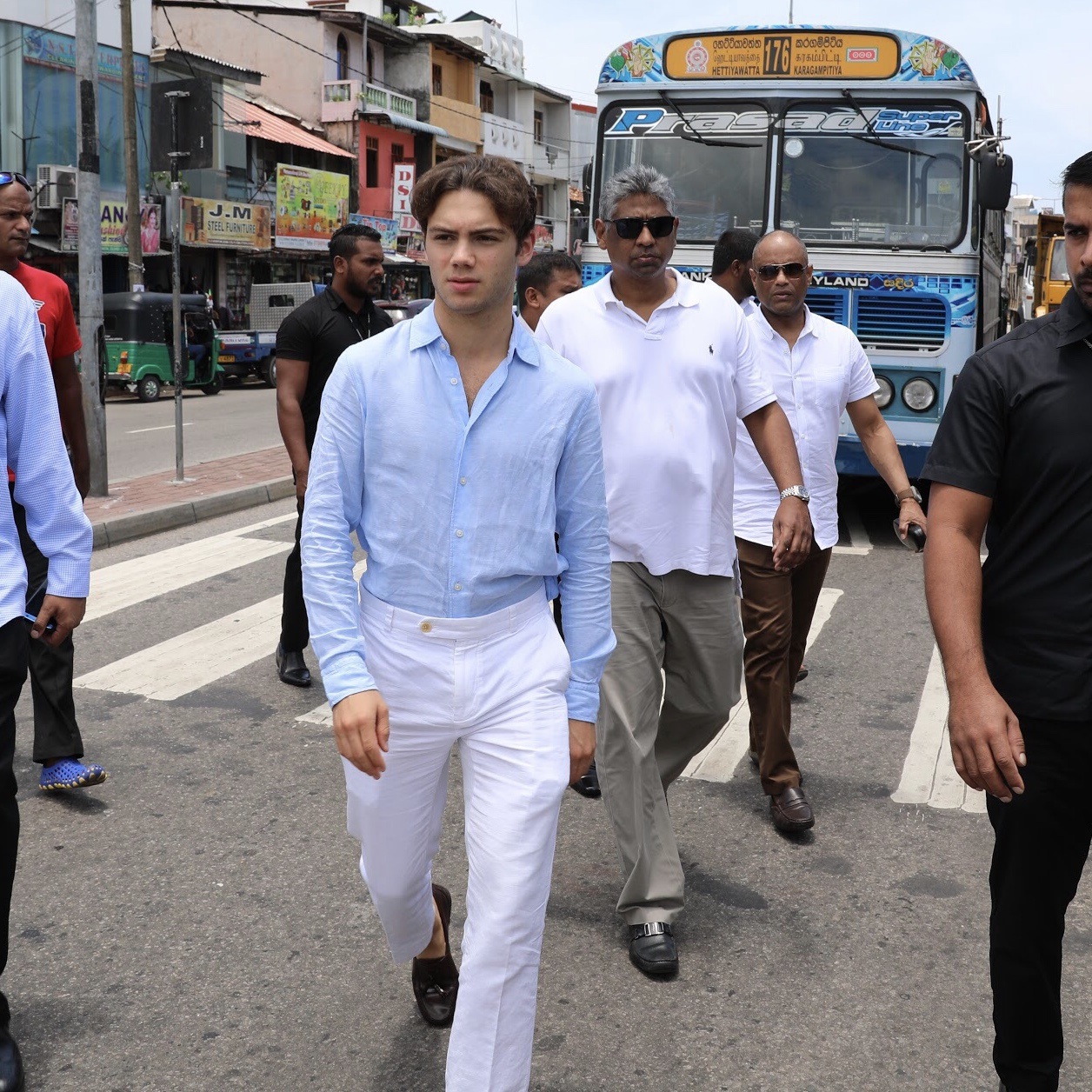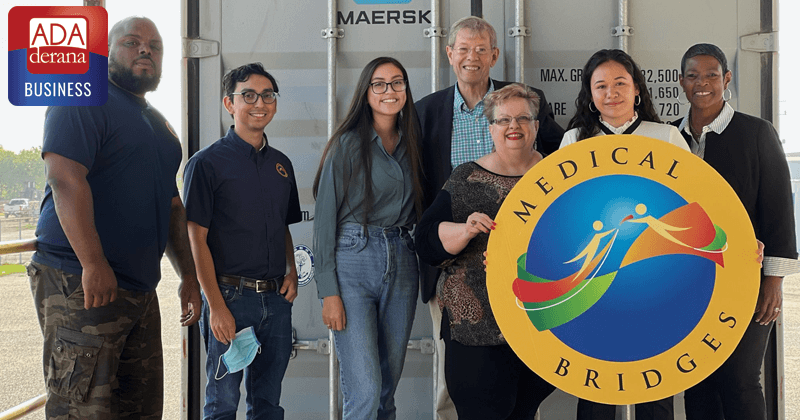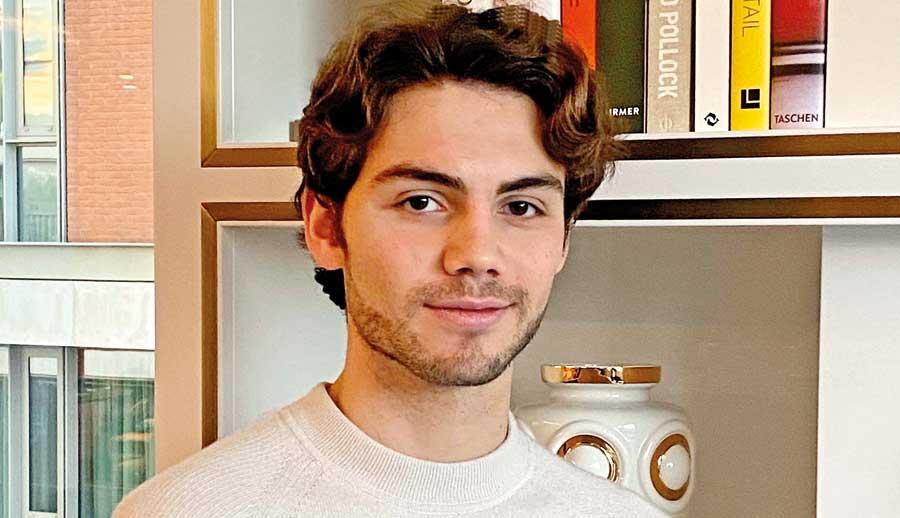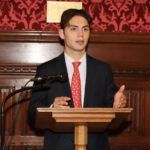David Linsey was studying for his Oxford finals when he learned the horrifying news that his brother and sister had been killed in a terror attack, on an Easter holiday in Sri Lanka. Months later, he returned to the country where they died. His aim? To make sure their deaths weren’t in vain.
As Sri Lanka’s coastline soared into sight, I had a better view than I was expecting. I’d never harboured serious hope of sitting in the cockpit of a commercial flight for landing, but there I was. My flight deck experience fell into the midst of a series of events that just don’t, or at least should not, happen to people. I never expected that, at 21, I would be meeting the leaders of a country. Or that days later, I’d be co-chairing a medical discussion at the Presidential Secretariat.
Above all, I never expected to wake up to the news that my brother and sister had been killed in a terror attack. On the morning of Easter Sunday on 21 April this year, Daniel, 19, and Amelie, 15, had been eating breakfast with my father in the Shangri-La hotel in Colombo, the Sri Lankan capital, when a suicide bomber detonated his explosive device in the restaurant. They never stood a chance. By a matter of inches, my father survived the impact of the blast. My mother, youngest brother and I had been thousands of miles away, back in England – I’d been busy studying for my final year exams at Oxford University. We had all FaceTimed regularly while they were away, and a day before the attack I had told my brother and sister that I loved them.

Amelie and Dan were two of the kindest, purest souls to have graced this Earth. In a way, they were almost too good for us. I felt myself faced with the thought that it was not just my family who’d lost them, but the world, and I became determined to do whatever I could to carry forward their spirits, which were full of giving and openness. I put my Economics degree on hold and resolved to help the people who needed it most: the Sri Lankans. Because they’d suffered even more than my family. At least 250 people were killed that day in six coordinated terror attacks, with more than 500 wounded. I setup the Amelie and Daniel Linsey Foundation, with the aim of raising money to help the island’s communities and improve the medical facilities that had faced such unfathomable burdens.
For me, returning to Sri Lanka was not a way to torture myself with visions of the past, but to make sure that Amelie and Daniel’s legacies live long into the future. By the time of the trip, the foundation I’d started in their memory had amassed more than £200,000. An amount like that comes with responsibility, and I often lay awake wondering if I’d taken things too far. I wondered, too, if I could face visiting the country where they’d died. In many ways, I was grateful the decision had been taken out of my hands – I had no choice but to make sure the funds raised in their names were being deployed in the right places. With me on the journey was Dr Tarek, a world-expert in trauma surgery from the McGill University Health Centre in Montreal, Canada, who’d given his time for free. He was going to develop a new model for trauma care across Sri Lanka, which our foundation would help fund. I was also joined by two of my best friends who, since the day of the attacks, had never left my side. Tara took photographs to document our travels and Ysabel helped me organise the meetings and keep notes. Their warmth would give me the strength to push through the hardest moments.
As the wheels of our aircraft touched the ground, the heaviness I felt on the flight was replaced by a flow of adrenaline. Suddenly, I was scared and excited. I thought I knew what I wanted to do, and I burned from within to do it. The next 15 days comprised a surreal series of events. Barely off the flight, I found myself rushed into a briefing. A ground team had been assembled by Mrs Jezaayar, a sweet but formidable Sri Lankan woman whom I’d met through her son in London. She helped on several occasions, as one thing quickly became apparent there’d be nothing normal about this trip. So it was that on the second day, I found myself summoned to the office of the President of Sri Lanka. Through a translator, I relayed my hopes of working with Sri Lanka’s medical network and announced my intention to visit hospitals at the bombing sites in Batticaloa and Negombo. I was told I was wasting my time. ‘Why travel to the hospitals,’ I was asked, ‘when they can travel to you?’ It turned out that all the directors of the hospitals affected by the attacks had been called to Colombo the next day to meet me and Dr Tarek. Having not even graduated from university, I’d not realised that calling my own centralised meeting of the medical fraternity was an option.
It was extraordinary, but that’s how Dr Tarek and I found our selves at the head of a discussion in the President’s office. It was a grand panel talk with conference-style microphones that resembled a model United Nations, but it was very much real. Dr Tarek explained his plans for trauma-care units and they were met with approval at the highest levels. We became more excited than ever to push onward.
Afterward, I accompanied the doctor on a visit to the National Hospital of Sri Lanka in Colombo. I had known that this was the place where Amelie and Daniel had been taken that fateful Sunday morning, but nothing prepared me for what I felt when I saw the ambulance dock and triage desk, knowing that they’d come through there. It was small comfort knowing that there was nothing that could have been done for them, such was the severity of their injuries.

Amelie and Daniel in Taiwan in 2018
In a quiet place, I met the doctor who’d received Dan at the hospital. My brother, by then, was unconscious and never woke up. The doctor spoke softly and his words were mercifully few. I thanked him for sticking with my father, too, on that terrible day. The doctor travelled with my dad when he took refuge in the American Embassy before being flown back to England.
The rest of the trip followed in a similarly productive but chaotic manner. Events that would have been inconceivable in London became commonplace and even farcical. For instance, we had planned to visit St Anthony’s Shrine, a church that had been one of the targets of the bombings: at least 93 people died within its walls. As we approached, intending to meet the priest, it became clear that something was not right. We were directed to park the vehicle around the corner and, stepping out of the car, were surrounded by cameras flashing in our faces. It felt like an ambush. I never thought I’d become the focus of a media frenzy, and as a result, I barely managed to speak to the priest.
In a brief moment of calm he was able to slip me the card for the director of Caritas, the charity of the Catholic church. They arranged for me to meet the families of Sri Lankan victims in a secure location, which was a gesture of kindness I won’t forget. Taken into a private room, I met two children orphaned in the attacks, and the family of an employee who had been killed in another hotel bombing on the day. We might all have been very different, but our pain was the same. And my desire to do all I could to alleviate it grew stronger.
Yet, no matter the size of the walls you build up, no matter how hard you prepare for pain that you know is coming, there will be things that take the breath out of your lungs when you least expect it. One day I was returning from a meeting. I stepped out of the car and into the lobby of our hotel. I felt a tap on my shoulder and turned a round to find a mobile phone thrust in my face. On the screen was a picture of my father. It was taken at the hotel where I was staying, barely hours after the attacks. It was here survivors had been moved to in the immediate aftermath of the bombings. Distressing did not begin to describe it. ‘Is this your father?’ the doorman asked. I hope that one day I’ll be able to forget that image. I barely made it back to my room.

Hanging over my head for much of my trip was the shadow of the near by Shangri-La. It was torturous at times to think that the place where my world ended was only a few metres down the road, and I grappled with how I could possibly face going there, especially after an image had thrown me so off balance. With the help of a comforting phone call from my mother, I came to the realisation that going to the Shangri-La on this trip was not part of my story.
There’s a line between a cathartic experience and ones that tips you over the edge. Perhaps over time this boundary will move and morph. Maybe one day I will return. For now, I’m proud of the things I achieved on the journey: I have emerged with a clear idea of what I want to do. With the team from the McGill Health Centre onboard, we could be well on our way to transforming trauma care in Sri Lanka. The Foundation also has concrete plans to build a disabled childrens’ playground and to sponsor the education of children orphaned following the attack.
Back in London, I have turned towards further projects: this month, I am organising our first charity ball at The Shard, home to London’s Shangri-La. I do my best to stay on the right side of the line between anxiety and excitement, and do not always succeed. But in the two weeks in Sri Lanka I learned more than I could have imagined about myself, about the country, and how I can help. Most importantly, I learned that this trip is just the start.




